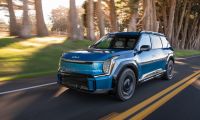If there is a more hassle-prone government automotive mandate than TPMS we can't name it. Maybe airbags. In any case, if Michelin and General Motors have their way, you won't need TPMS anymore because there won't be any tire pressure to monitor. The pair are teaming up on an airless tire and wheel combination they say will be ready by 2024 (five years from now). The new name for what was previously Tweels is the "Uptis Prototype (or “Unique Puncture-proof Tire System.”

“General Motors is excited about the possibilities that Uptis presents, and we are thrilled to collaborate with Michelin on this breakthrough technology,” said Steve Kiefer, senior vice president, Global Purchasing and Supply Chain, General Motors. “Uptis is an ideal fit for propelling the automotive industry into the future and a great example of how our customers benefit when we collaborate and innovate with our supplier partners.”
GM and Michelin list four main benefits of the new system:
- Reduces the number of punctured or damaged tires that are scrapped before reaching the end of their life cycle.
- Reduces the use of raw materials, energy for production and emissions linked to the manufacture of spare tires and replacement tires that are no longer required.
- Lasts longer by eliminating irregular wear and tear caused by over- or under-inflation.
- Reduces dangers related to flats and blowouts.
This isn't the first we've heard of these airless tires and wheels. In fact, we were reporting on this same technology five years ago. Funny how five years is always the defacto "some time in the near future" point chosen by automakers and suppliers for the technology they can't just seem to get right.
We are pulling for Michelin here and would love to see a major automaker like GM be the launch partner. Anything to get rid of the darn TPMS sensors we all have to hassle with. We see some real technical hurdles. First up, if the rim and spokes are a composite or synthetic resin material, the wheel is unlikely to perform the same at 15 below zero F as it will at 115F, the actual operating range of temperatures in the mainland U.S market. The feeling will vary widely. Temperature swings of 50F in one day are not uncommon in the U.S. so swapping the contact rubber isn't going to solve this issue. Second, it is too good to be true. Imagine a Michelin man walking into a boardroom and announcing "Great news! We just found a great way to sell fewer tires and make less money!" Maybe we are just overly skeptical, but we doubt that these new wheel and tires combos are going to be "affordable" in the sense we consider tires now. We hope we are wrong. We will find out in just "five more years."
Follow John Goreham on Twitter at @johngoreham and send him news tips.
Set as google preferred source












Comments
Only the US us using F …
Permalink
Only the US us using F (Fahrenheit) the rest of our planet uses C (Centigrade). So why not starting to write in understandable units for the whole world? So selfish or do you direct these postings only to US readers?
Celsius grades (°C), not…
Permalink
In reply to Only the US us using F … by Jos (not verified)
Celsius grades (°C), not Centigrade.